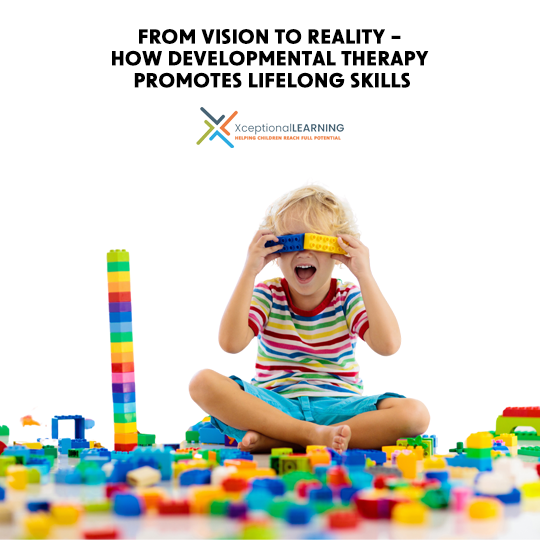From Vision to Reality – How Developmental Therapy Promotes Lifelong Skills
admin February 12th, 2025

Clinically Reviewed by
Akshara Sruthi. S
Clinical Psychologist
Developmental therapy is an integral part of a child’s early intervention when facing developmental delays. While its primary goal is to address specific challenges, the broader aim is to equip children with essential skills to help them navigate various life stages. The transformative process of developmental therapy not only targets immediate needs but also builds a foundation for lifelong abilities that benefit children long after their therapy ends. This blog will explore how developmental therapy promotes lifelong skills, from social and communication abilities to cognitive and motor functions.
Understanding Developmental Therapy
- Definition: Developmental therapy is designed for children facing delays in various developmental areas, including speech, motor skills, cognition, and social-emotional growth.
- Holistic Approach: Unlike specialized therapies (e.g., speech or occupational therapy), developmental therapy takes a comprehensive approach, addressing multiple aspects of a child’s development.
- Individualized Support: Therapy is personalized based on the child’s needs, ensuring they reach developmental milestones at their own pace.
How Developmental Therapy Promotes Lifelong Skills
a) Communication Skills
- Importance: Communication is key to every human interaction, affecting social, academic, and professional outcomes.
- Verbal Communication: Therapy helps children with speech delays by introducing words, phrases, and sentences through play and structured activities.
- Non-Verbal Communication: It also focuses on teaching body language, gestures, and facial expressions, which are equally important in conveying emotions and thoughts.
- Long-Term Impact: Strong communication skills help children engage meaningfully with others, fostering better social relationships, academic success, and future professional growth.
b) Social Interaction Skills
- Understanding Social Cues: Developmental therapy helps children interpret social cues (like facial expressions, tone of voice, and body language), which can be challenging for those with developmental delays.
- Building Friendships: Through structured social skills training, children learn to initiate and maintain friendships by taking turns, sharing, and resolving conflicts.
- Long-Term Impact: Mastering social interaction skills prepares children for a lifetime of positive social engagements, from childhood friendships to workplace collaboration and family dynamics.
c) Emotional Regulation and Self-Control
- Managing Emotions: Therapy teaches children to recognize, understand, and manage their emotions, reducing impulsive behaviors and enhancing self-regulation.
- Coping Strategies: Children are taught techniques like deep breathing, mindfulness, or using “feelings charts” to handle emotions in healthy ways.
- Long-Term Impact: Emotional regulation leads to better mental health, stronger relationships, and enhanced decision-making skills in adulthood.
d) Cognitive Skills Development
- Core Cognitive Abilities: Developmental therapy focuses on memory, attention, reasoning, problem-solving, and logical thinking.
- Engaging Activities: Through games, puzzles, and tasks that challenge their thinking, children develop critical cognitive functions.
- Long-Term Impact: Cognitive skills lay the foundation for academic success and are essential for adapting to various life challenges, both personal and professional.
e) Motor Skills (Fine and Gross)
- Fine Motor Skills: Therapy addresses skills like holding a pencil, cutting with scissors, or using utensils—small, precise movements that are essential for daily tasks.
- Gross Motor Skills: It also works on larger movements like running, jumping, or balancing, which help with physical independence and fitness.
- Long-Term Impact: Strong motor skills support lifelong physical activities, from basic tasks like driving to maintaining an active lifestyle and physical health.
f) Problem-Solving Abilities
- Critical Thinking: Developmental therapy encourages children to think critically and find solutions to everyday problems.
- Practical Problem-Solving: Whether it’s a puzzle, a classroom challenge, or navigating a new situation, children learn to approach problems systematically.
- Long-Term Impact: Problem-solving skills empower children to handle complex issues throughout their lives, whether in personal relationships, work environments, or daily decisions.
Real-Life Success Stories
- Case Example 1: A child with speech delays begins therapy with basic vocabulary and, over time, learns to form sentences and engage in conversations. This skill aids them in forming friendships and excelling academically.
- Case Example 2: A child struggling with emotional regulation learns techniques to manage frustration, leading to better behavior at school and improved interactions with peers.
- Impact of Therapy: These children go on to develop confidence, autonomy, and a strong sense of social and emotional well-being, demonstrating the long-term value of developmental therapy.
The Role of Parents, Educators, and Therapists
- Collaboration: The success of developmental therapy requires teamwork among parents, educators, and therapists.
- Consistency: By reinforcing therapy skills at home and school, children benefit from consistent application, accelerating progress.
- Ongoing Support: Therapists provide guidance to parents and educators on how to create environments that support the child’s development beyond therapy sessions.
In conclusion, Developmental therapy provides children with a solid foundation of skills that will last a lifetime. By focusing on essential areas such as communication, social interaction, emotional regulation, cognitive development, and motor skills, this therapy equips children with the tools they need for success throughout adulthood. If you’re looking for a comprehensive platform to support your child’s development, explore XceptionalLEARNING. Our Developmental Therapy Services are tailored to meet your child’s unique needs, promoting growth in key areas such as communication, emotional regulation, and social skills. We also provide extensive Child Development Support to ensure your child receives the guidance needed for their overall well-being. With resources like the Digital Activity Book, we offer engaging tools that help lifelong learning and development. Contact us at +91 8921287775 to see how our team can support your child’s journey and set them up for long-term success.

